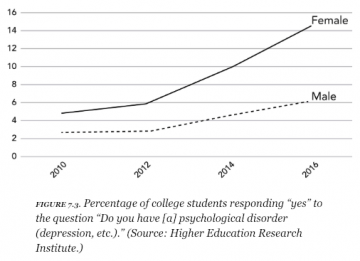Original post by Brogan Pratt on January 16, 2019
iGen, (sometimes referred to as GenZ) is the latest generation born from 1994 onwards. They are characterized by being born into the internet age, and to have never experienced a world without global connectivity. They are also, radically different from millennials.
iGen
Jean Twenge is a psychologist who researches generational differences. She has recently written a book called iGen, and the title of this post is the title of her book. Using four large US databases on teenage and young adult health :
- Monitoring the Future
- The Youth Risk Behaviour Surveillance System
- The American Freshman Survey
- General Social Survey
She notes a few major findings in her research:
- iGeners are spending less time interacting face to face with inperson contact, and are spending more time online interacting anonymously and on social media.
- Their dreams for career aspirations are down, and they are less rebellious than their Millennial counterparts
- They are less happy than previous generations, experience more anxiety (surpassing depression) and this has hit girls harder than boys.
- iGen is “growing up more slowly”, in that they are achieving adulthood “milestones” later in life (driving, moving out, having committed relationships, careers, marriage, children)
- Depression rates in Adolescent girls are rising dramatically since 2012 (11% to almost 19% of adolescent girls who had at least one major depressive event)

- Two activities are strongly correlated to increased depression and suicide related outcomes: electronic device use and watching TV (However, for kids that are highly sociable, this doesn’t seem to affect them)
- Self reported responses of university students asked if they have a “physcological disorder” (yes) responses are up from 5%* in 2012 for females to 15%*, and Males are up from 3%* to 6%*

Granted, Twenge’s book, iGen, has a tendency of over-representing negative statistics, however, this increase in anxiety (at such a rapid rate!) is nonetheless alarming regardless of source. Twenge makes a convincing argument that these factors are heavily influenced by a rise of social media culture, excessive device use, and less person to person communication.
Sources:
–(Lukianoff & Haidt, The Coddling of the American Mind, 2018)

It has been a while since I first picked up this book but reading Brogan’s summary enticed me to scroll through the pdf pages again. Just as I remember, Jean Twenge’s work pulls back the curtain on some disturbing technological trends that researchers are still just starting to document. Every reader of the book likely recognizes some of the key examples, trends and commentaries that Jean shares in her study. Understanding this and every subsequent internet generation is the quintessential starting point of the inevitable corrections that society will have to make as we navigate the digital age. Teachers and more importantly parents need to see the internet and digital technology in general as not only inevitable but as a positive force in our long term progress that should be embarrassed but cautiously. My only critique on what I have read in the book is that it does not attempt to address or even mention contradicting explanations for users to be “less happy.” As a result her arguments, although supported by numerous anecdotes, often seem coincidental rather than clearly causative. Overall a great book that asks some very important questions.